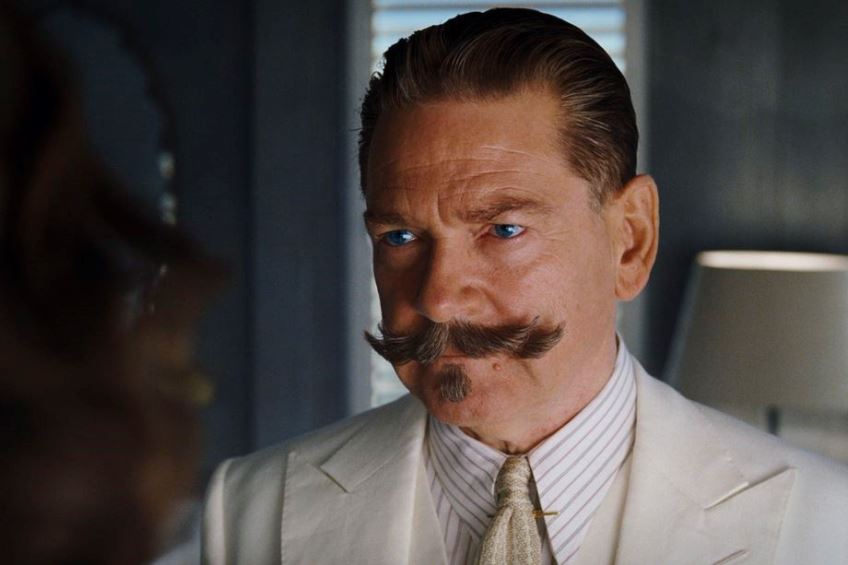Joyce Glasser reviews Death on the Nile (February 9, 2022) Cert 12A, 127 mins.
Kenneth Branagh is riding high on his six BAFTA nominations and seven Academy Award nominations for his film Belfast, but like the true thespian he is, he can go from a heartfelt, autobiographical crowd pleaser about growing up in a working-class neighbourhood during the Irish troubles like Belfast, to the artificial theatricality of the inbred, upper-class prejudices and duplicity of Dame Agatha Christie without twirling his outlandish Herculean moustache.
He can and so he does, having found in the huge library of the world’s most popular mystery writer, Dame Agatha, endless possibilities for remakes that will not offend any foreign territory. They may even delight North Korea, China and Putin’s Russia as a cautionary tale of Capitalist decadence.
And Branagh has, as he did in the pre-Covid Murder on the Orient Express, assembled an A-list cast that comes close to rivalling the 1978 adaptation. He has guaranteed exoticism. Christie wrote the novel after returning from Egypt where her second husband, the British archaeologist Max Mallowan was excavating. Like her character Linnet, Christie married Mallowan after a whirlwind romance, and the book was dear to her heart. What Branagh hasn’t, is a screenplay by the equivalent of Peter Schaffer or a story that, even if far-fetched, you might still find absorbing.
As Branagh stars in the role of Hercule Poirot, he gives himself more dimensionality than any of the other characters in Death on the Nile. Did you know that the sedentary, immaculately coiffed and dressed, brilliant detective who finds germs repugnant and, unlike Columbo, shows no affinity for animals began life as a farmer?

The prologue is as much a backstory to Poirot’s moustache as to his character. Young Poirot uses his formidable powers of deduction to save his regiment from a suicidal manoeuvre in 1914, but not his commander. After the battle he is visited in the infirmary by his true love, Katherine (Susannah Fielding). As we learn later, she is killed by a mortar explosion before they can marry, but not before she suggests that the self-conscious soldier grow a moustache to conceal his facial wounds. Poirot tells this story in the film to explain why he has never married and rejects intimacy.
Cut to 1937, on the eve of the WWII, and a much older Poirot enters a nightclub where he is captivated by the jazz singer, Salome Otterbourne (Sophie Okonedo), in a change from the novel. On the dancefloor he notices the beautiful Jacqueline “Jackie” de Bellefort (Emma Mackey) and her handsome fiancé Simon Doyle (Armie Hammer) executing some pretty steamy dirty dancing.
It seems like a coincidence, but turns out not to be, that Jackie’s old friend Linnet Ridgeway-Doyle (Gal Gadot), a single heiress, stunning in a regal, confident, way, enters the room. Jackie tells Linnet that she and this dashing young man about town are madly in love and implores her old friend to help him find a job in Linnet’s newly acquired newspaper. To seal the deal, Simon and Linnet have a dance, and Jackie watches with alarm as their dance turns pretty steamy, too.

A few weeks later, as coincidence (or is it?) would have it, Poirot is vacationing in Egypt and, through an old friend, Bouc (Tom Bateman), travelling with his wealthy artist mother Euphemia (Annette Bening), becomes involved in Linnet’s and Simon’s honeymoon celebration.
Linnet is alarmed by the uncanny presence of Jackie who is stalking her. The couple confide in Poirot, and he agrees to have a talk with her but will not take payment. Linnet wants to go home but does not want to spoil Simon’s honeymoon. The compromise is to leave Jackie behind by hiring the elegant Nile river boat, the SS Karnak, and continuing the party floating down the river.
The guests pile onboard. These include Dr Linus Windlesham (Russel Brand), Linnet’s former fiancé; Andrew Katchadourian, (Ali Fazal) Linnet’s slippery lawyer who is continually pushing contracts in front of her to sign; Marie Van Schuyler (Jennifer Saunders) Linnet’s godmother, has become a Communist and, while depriving herself of nothing, abhors excess wealth. Louise Bourget (Rose Leslie), Linnet’s French maid with a dark secret, is seen trying on Linnet’s most expensive necklace that later goes missing.
There are more guests, including Bouc and Euphemia, intent on preventing Bouc from marrying below his station with Salome’s niece and manager, Rosalie (Letitia Wright), even if she is Linnet’s old classmate. And to this list we must add Jackie, for while you’d think she would have been banned from the SS Karnak, somehow, she is on board. The explanation given to Linnet is hardly convincing since Linnet is paying a fortune for the hire of the boat so that Jackie would be left ashore.
This is, however, a joyless, dull bunch of people, and Poirot’s endless interviewing of the suspects, is hardly diverting as they all have plausible motives. How do you begin to weigh them? Despite a stab at “diversity” with a lesbian couple, and two sophisticated, articulate and educated black women who are guests, not servants, the characters are functional and seem to exist to be divided into suspects or victims. Yes, victims. For the first person to die, while the most obvious, is not the last, and the final list of suspects is reduced by the three onboard murders.
This begs the question, what has happened to Poirot? For one person to die might be a mistake, but three is simply careless. Has Poirot been seduced and distracted by Salome (as the name suggests) or have the performances of the main suspects fooled him? They may not fool you, reader, for, despite some red herrings to distract us, you might know who dun it long before Poirot. The absence of any mention of bringing in the police or contacting Embassies becomes a distraction.
Nonetheless, the luxurious cruise and the beauty of the settings and a stab at solving the case are reasons to see the film. You will want to book yourself a room at the Cataract Hotel in Aswan, take a river cruise to the Temple of Karnak in Luxor, and bask in the sun-drenched colours of the pyramids captured by cinematographer Harris Zamabarloukos, who has shot all of Mr Branagh’s films since Thor in 2011, including the black and white Belfast.




